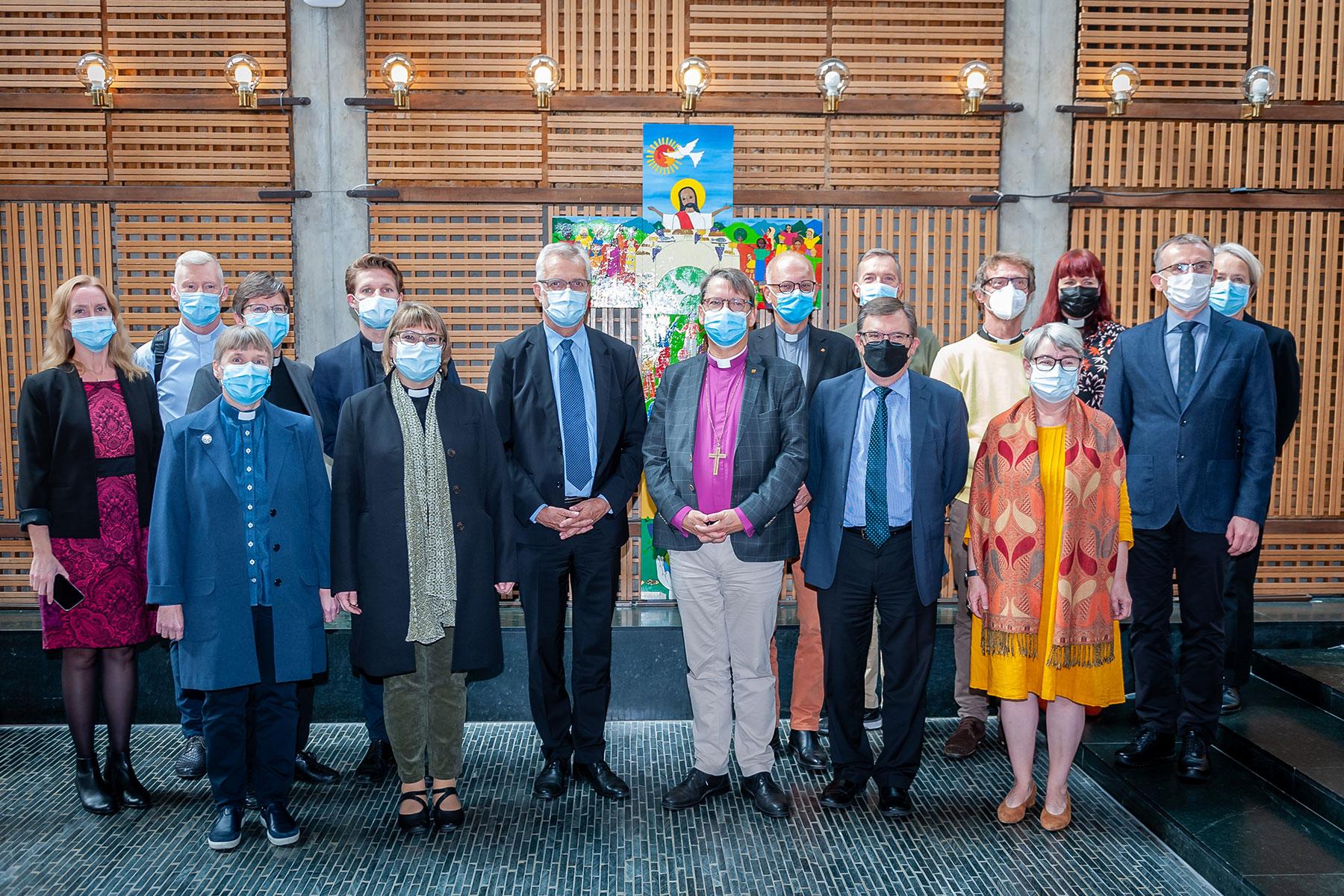Lund ecumenical commemoration has inspired local initiatives

Diocese of Lund Bishop Johan Tyrberg and a delegation of pastors and deans visiting the LWF Communion Office, hosted by General Secretary Rev. Dr Martin Junge. Photo: LWF/S. Gallay
LWF and Diocese of Lund leaders reflect on joint efforts for peace and reconciliation
(LWI) – Almost five years since the historic commemoration of 500 years of the Reformation in Sweden, there is a growing spirit of ecumenism and commitment among Catholics and Lutherans to work for peace and reconciliation, not only in the event’s host city Lund, but also in many other places around the world.
Diocese of Lund Bishop Johan Tyrberg and a delegation of pastors and deans visited The Lutheran World Federation (LWF) Communion Office in Geneva on 22 September, and discussed the initiatives resulting from the 2016 commemoration. During the meeting hosted by LWF General Secretary Rev. Dr Martin Junge, examples were also shared from the communion’s work.
The joint commemoration five years ago opened the way for a new celebration of ecumenism and peace in Lund.
Tyrberg, who has been bishop of Lund since 2014, reflected on the significance of the joint Common Prayer co-hosted by then LWF President Bishop Dr Munib A. Younan, General Secretary Junge and Pope Francis in the Cathedral of Lund on 31 October, Reformation Day. He said the joint commemoration five years ago opened the way for a new “celebration of ecumenism and peace in Lund” and working together. “It has given me something new about being Lutheran, a new strength and identity as a bishop of the Lutheran church,” he said, referring to the ecumenical vespers and other encounters that Lutherans and Catholics have been organizing since 2016.
“We have to keep this memory and give it to the next generation of pastors and parishes,” Tyrberg said. He talked of the potential for ecumenical collaboration in 2022 to celebrate 500 years of Luther’s translation of the Bible.
Commitment to a strong foundation
In his address, LWF General Secretary Rev. Dr Martin Junge reflected on the 1947 founding of the LWF in Lund, and how the 2016 commemoration deepened the commitment to continue working for justice, peace and reconciliation. “We cannot be talking about ourselves in splendid isolation. From conflict to communion will always take place when engaging with others as we reflect on how to embrace reconciliation as a gift of Christ.”
Referring to the four pillars on which the LWF was founded—serving people in need; engaging in common mission initiatives; joint efforts in theology; and ecumenical engagement—Junge spoke of the need to continue dialogue with other Christians, and with other faith communities. “Coming around the table is one of the traditional marks of the church.”
New initiatives at the grassroots
The joint commemoration has helped to define LWF’s own ecumenical priorities, providing a basis for dialogues and conversations with other church bodies in the common goal toward Christian unity, said Prof. Dr Dirk Lange, Assistant General Secretary for Ecumenical Relations. The Commitments on the Ecumenical Way to Ecclesial Communion focus on greater interaction between local and global ecumenical initiatives as well as on reception and the crucial engagement of all in pastoral ecumenism.
Two principal commitments from Lund—the Joint Statement on parish level collaboration and the Declaration of Intent on closer cooperation in humanitarian response and sustainable development—have also inspired initiatives at the local level. Ms Eva Christina Nilsson, director of the LWF Department for Theology, Mission and Justice and Rev. Dr Ireneusz Lukas, Regional Secretary for Europe shared some examples.
In Nepal, LWF World Service, signed a country-level memorandum of understanding with the Catholic relief agency Caritas Internationalis in 2017. The goal is to institutionalize their long-standing partnership and deepen collaboration when serving refugees, internally displaced people and other marginalized communities.
In majority Muslim countries such as Indonesia, the global agreement between the LWF and Islamic Relief Worldwide, has made it easier for Lutheran Christians to be more respected by Muslims.
Inspiration toward peace building was cited in the case of the Central African Republic, where a Catholic church leader is working closely with Protestant pastors and the local Imams to show how dialogue and mutual listening can transform a painful civil conflict into a peaceful situation.
Starting from the point of unity
The central question of baptism was also discussed, and reference was made to the LWF Nordic region initiative, Churches in Times of Change. The churches in Denmark, Finland, Iceland, Norway and Sweden began the project in early 2021 to understand why there is a decline in infant baptism and at the same time an increase in youth and adult baptisms.
In concluding remarks, Bishop Tyrberg said one of the lessons from the Lund commemoration and the journey from conflict to communion is the importance of engaging each other from what Lutherans and Catholics share in common. “It is a matter of starting in the unity and then going on to where we do not agree.”
LWF/P. Mumia
The founding and First Assembly of the LWF in 1947 was held in Lund, Sweden. The diocese of Lund is one of the 13 dioceses of the Church of Sweden, the third-largest LWF member church with nearly 6 million members.



